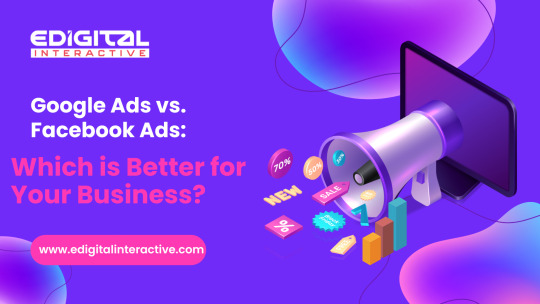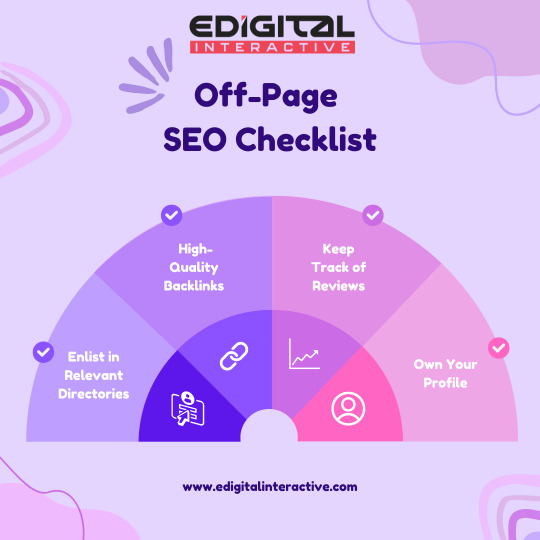Text
Google Ads vs. Facebook Ads: Which is Better for Your Business?
Choosing the right ad platform can be tricky — especially when both Google Ads and Facebook Ads are powerful in their own way. So, which one should your business invest in? Let’s break it down. 👇

Google Ads: Intent-Based Advertising
Google Ads (formerly AdWords) targets users actively searching for something. Your ad shows up just when they need it.
Best for: ✅ High purchase intent ✅ Local services & e-commerce ✅ B2B lead generation
Pros: ✔️ Reach people actively searching for your product/service ✔️ High-quality traffic ✔️ Keyword-based targeting
Example: A user types “best nail salon near me” — boom, your salon ad appears!
📲 Facebook Ads: Interest-Based Advertising
Facebook (and Instagram) Ads are great for creating demand and awareness by targeting users based on interests, behavior, and demographics.
Best for: ✅ Brand awareness ✅ Lifestyle products ✅ Retargeting existing visitors
Pros: ✔️ Highly visual and creative ✔️ Super precise audience targeting ✔️ Great for storytelling & engagement
Example: You run a video showing a summer nail art collection to fashion-forward women aged 20-35.
🎯 So…Which One Wins?
✅ Go with Google Ads if your goal is direct leads, phone calls, or quick conversions. ✅ Choose Facebook Ads for brand building, product awareness, and nurturing your audience.
💡 Pro tip: For most businesses, a combo of both works best — Google for conversions, Facebook for visibility.
What’s worked better for your brand — Facebook or Google? Share your experience in the comments!
#DigitalMarketing#FacebookAds#GoogleAds#MarketingStrategy#PaidAds#OnlineAdvertising#SocialMediaMarketing#Quinfy#AdTips#BrandGrowth
0 notes
Text
On-Page SEO vs. Off-Page SEO: What’s More Important?
If you’re trying to rank higher on Google and drive more traffic to your website, you’ve probably come across the terms On-Page SEO and Off-Page SEO. But what do they mean, and which one is more important for your website’s success? Let’s break it down.
What is On-Page SEO?
On-Page SEO refers to all the optimizations you make directly on your website to improve its rankings. It ensures that search engines understand your content and users have a great experience.

Key On-Page SEO Factors:
High-Quality Content: Write informative, engaging, and keyword-rich content. Keyword Optimization: Use relevant keywords naturally in titles, headings, and content.
Meta Tags & Descriptions: Well-written title tags and descriptions improve click-through rates. URL Structure: Short, clean, and keyword-friendly URLs work best. Internal Linking: Link to relevant pages within your website to improve navigation. Page Speed: Fast-loading pages enhance user experience and SEO rankings. Mobile-Friendliness: Your site must be optimized for mobile users.
Why It Matters: On-Page SEO ensures your website is properly structured, making it easier for search engines to index and rank your content.
What is Off-Page SEO?
Off-Page SEO refers to actions taken outside of your website to build its authority, credibility, and trustworthiness.
Key Off-Page SEO Strategies:
Backlink Building: Get quality links from other reputable websites. Social Media Marketing: Promote content on platforms like Instagram, Twitter, and LinkedIn. Guest Blogging: Publish articles on high-authority sites to drive traffic and build credibility. Online Reviews & Reputation Management: Positive reviews boost trust and rankings. Local SEO & Citations: List your business on directories like Google My Business.
Why It Matters: Off-Page SEO helps search engines see your website as valuable and credible, improving rankings.
On-Page SEO vs. Off-Page SEO: Which One is More Important?
The truth is both are essential!
On-Page SEO lays the foundation for your website by ensuring it’s user-friendly, optimized, and structured correctly. Without strong On-Page SEO, Off-Page efforts may not yield great results.
Off-Page SEO builds your website’s credibility and authority, signaling to search engines that your site deserves a higher ranking.
If you’re just starting, focus on On-Page SEO first by optimizing your content and website structure. Once that’s strong, implement Off-Page SEO strategies like backlinking and social media promotion to boost your site’s credibility.
Final Thoughts
SEO isn’t about choosing between On-Page and Off-Page SEO—it’s about balancing both! If you create high-quality content, optimize your pages, and build strong external signals, your website will rank higher and attract more visitors.
0 notes
Text
Google Algorithm Updates 2025: What It Means for Your Website
Google’s search algorithm is constantly evolving to provide users with the most relevant, high-quality content. As we step into 2025, several updates are reshaping how websites rank on search engine results pages (SERPs). For digital marketers, SEO specialists, and business owners, staying ahead of these changes is crucial to maintaining online visibility.
Key Google Algorithm Updates in 2025
AI-Powered Search Enhancements Google continues integrating AI into its ranking systems, with a stronger emphasis on search intent and context. Google's AI models, like MUM (Multitask Unified Model), are refining content understanding and rewarding pages that provide comprehensive, authoritative answers.
User Experience (UX) Signals Matter More Core Web Vitals remain critical, but now Google has placed even greater emphasis on engagement metrics such as bounce rate, session duration, and interaction levels. A seamless, fast, and mobile-friendly website is essential to rank higher.

E-E-A-T (Experience, Expertise, Authoritativeness, Trustworthiness) Takes Center Stage Google’s latest updates prioritize content that demonstrates real-world experience and credibility. Websites that showcase firsthand expertise, author credentials, and authoritative sources are ranking better.
Video and Interactive Content Boost Rankings With the rise of video content, Google is now indexing and ranking videos more effectively. Short-form videos, interactive elements, and embedded media enhance user engagement, improving SEO performance.
Zero-Click Searches & Featured Snippets Evolution Google is refining its featured snippets and zero-click search results, meaning more users get answers directly on the SERP. To capitalize on this, websites should optimize for featured snippets and structured data markup.
Voice Search and Conversational Queries Gain Traction Voice search optimization is no longer optional. With AI-driven voice assistants growing in popularity, websites must adapt by focusing on conversational, long-tail keywords and natural language queries.
What This Means for Your Website
✅ Prioritize High-Quality, Authoritative Content – Focus on providing detailed, well-researched, and user-centric content that aligns with search intent. ✅ Optimize for AI Search & Featured Snippets – Structure content to answer user questions concisely and leverage schema markup for better visibility. ✅ Improve Core Web Vitals & UX – Ensure fast page speeds, intuitive navigation, and mobile-first design to meet Google’s experience standards. ✅ Leverage Video SEO – Create engaging video content and optimize metadata for improved discoverability. ✅ Enhance Trust Signals – Include expert author bios, citations, and trust indicators to establish credibility.
Final Thoughts
Google’s 2025 updates reinforce the importance of user-focused, high-quality content. By staying proactive and optimizing your website according to these new ranking factors, you can maintain or improve your SEO performance.
Need expert guidance on adapting to these changes? Contact eDigital Interactive Agency for tailored SEO strategies that drive results. 🚀
1 note
·
View note